Britain’s lagging vaccine roll-out could derail plans to drastically ease lockdown over the next few months, a leading infectious disease expert warned today.
Ministers are in a race against time to vaccinate as many people as possible over the next few weeks before millions of second doses have to be dished out.
But Professor Paul Hunter, from the University of East Anglia, said Britain will ‘struggle’ to get enough people immunised to stick to ambitious plans to end lockdown by June unless rates ‘pick up very soon’.
He said: ‘This could lead to more potentially vulnerable individuals being unprotected for a lot longer than we had expected as we try to relax restrictions further. This would have the real potential to derail the UK’s road plan for coming out of lockdown.’
Boris Johnson put a successful vaccine roll-out at the heart of his lockdown-easing plan yesterday. As long as the operation continues successfully, all restrictions could be dropped in England by June 21, but any hiccups along the way could threaten that target.
Almost 18million Britons have already received a first dose of a Covid vaccine but the roll-out appears to have slowed drastically over the weekend.
Just 210,000 vaccines were dished out yesterday, down a quarter on last Tuesday. And Sunday was the worst daily performance since the NHS operation began to gather speed last month, with just 150,000 doses administered.
Matt Hancock today claimed a delay in the supply schedule would lead to a ‘quieter week’. But the Health Secretary also said there would be some ‘bumper weeks in March’ to make up for the lag.
However, when asked to comment on Mr Hancock’s claims that supply was to blame for the drive slowing down, Pfizer insisted its vaccine deliveries are on track.
The pharmaceutical giant – which manufactures one of the two vaccines being administered in Britain – told MailOnline there were ‘no supply challenges’ and deliveries were arriving as planned.
AstraZeneca – which makes the other jab currently deployed in the UK – yesterday admitted there were ‘fluctuations’ in supply at plants but that it was still ‘on track’ with orders.
With a rapid inoculation drive crucial to Britain’s hopes of lockdown being eased in the next few months, critics say there is ‘no excuse’ for the rollout slowing down.
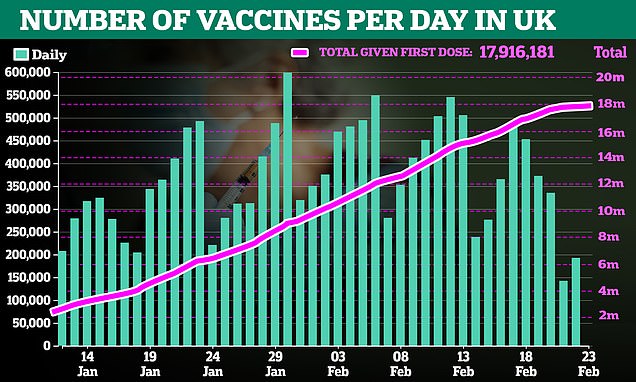
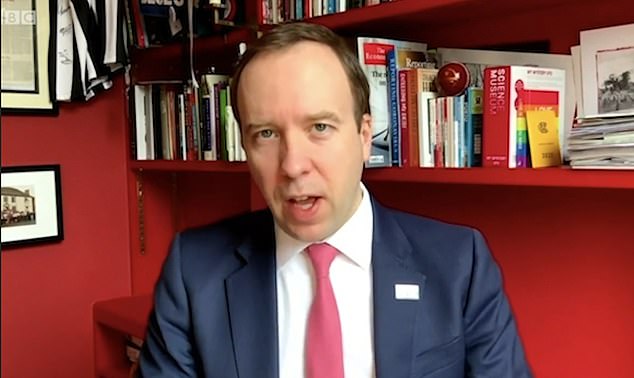
Health Secretary Matt Hancock has warned that the vaccine rollout is going to suffer a dip this week but there will be a bump in March to compensate
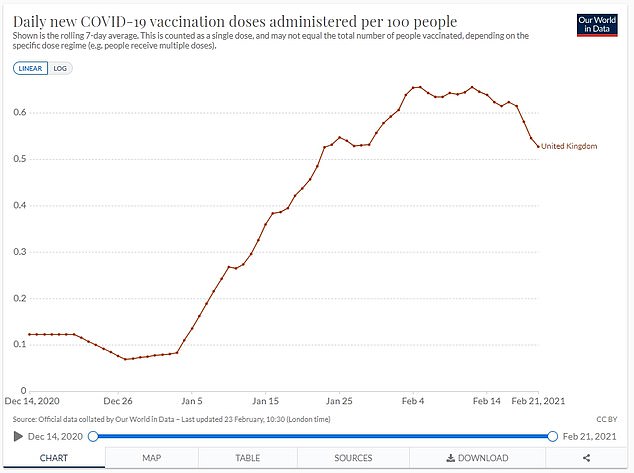
But Department of Health statistics show just 360,000 doses were dished out every day last week, on average. This is down 17 per cent on the rolling average of nearly 435,000 last Sunday. It is the lowest rate since January 22
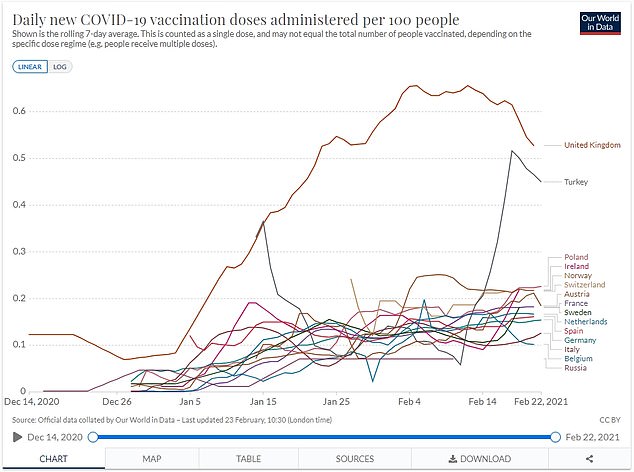
Britain is still jabbing more people for the size of its population every day than other major European nations, even though its drive has slowed

Falling demand may be a result of the Government being too ‘rigid’ about its priority list, said the Francis Crick Institute’s Sir Paul Nurse, with only people in the top four priority groups eligible for vaccines so far – although the NHS today widened it to over-65s in group five
With the UK anxious to rattle through its vaccination programme to stem the flow of Covid deaths and allow lockdown rules to be loosened, ministers have been forced to defend the pace of the rollout as its speed goes through peaks and troughs.
The Government has repeatedly blamed ‘lumpy supply’ and the need to wait for manufacturers for holding back the UK’s rollout as both Pfizer and AstraZeneca had to reorganise their factories in January to scale up their plans.
Ministers have yet to receive any supplies of the other jab approved for use in Britain, made by Moderna, although this is expected to come within the next couple of weeks.
But there are also issues with the rollout process which is also holding the NHS back from hitting its maximum pace, with it already proving it can do almost 600,000 per day.
‘Compelling’ real-world data from Scotland shows one dose of either jab cuts risk of being hospitalised by up to 95%
Covid vaccines being used in Britain are working ‘spectacularly well’ and cutting hospital admissions caused by the virus by as much as 95 per cent, according to the first real-world evidence of the roll-out.
Researchers yesterday called the results ‘very encouraging’ and claimed they provided ‘compelling evidence’ that they can prevent severe illness.
Scientists counted Covid hospital admissions in Scotland among people who had had their first dose of a jab and compared them to those who had not yet received a dose of either the Pfizer or Oxford/AstraZeneca vaccine.
In a ray of hope for Britain’s lockdown-easing plans, results showed the jabs slashed the risk of being admitted to hospital with Covid by up to 85 and 94 per cent, respectively, four weeks after a single dose.
The study — carried out by academics from the universities of Edinburgh and Strathclyde, as well as Public Health Scotland — was the first of its kind. But it currently doesn’t have enough data to analyse how well the jabs prevent death or stop transmission of the virus.
Lead researcher Professor Aziz Sheikh said: ‘These results are very encouraging and have given us great reasons to be optimistic for the future. We now have national evidence that vaccination provides protection against Covid hospitalisations.
‘Roll-out of the first vaccine dose now needs to be accelerated globally to help overcome this terrible disease.’
Advertisement
Some GP surgeries are not offering jabs on Sundays, potentially because they lack a proper incentive on top of spending all week working as normal, critics say.
And some centres have been forced to shorten their opening hours because of a lack of demand for appointments.
Mr Hancock today claimed vaccine roll-out figures will continue to stay low for the rest of this week in an interview with LBC’s Nick Ferrari.
He said it will be a ‘quieter week’ for the vaccine rollout because of a drop in stockpiles, warning that the success of the drive was ‘all about supply’.
Mr Hancock added: ‘We have got a quieter week this week and then we’re going to have some really bumper weeks in March.’
Pointing the blame at vaccine manufacturers, he also claimed there has been ‘ups and downs’ in the delivery schedule.
A spokesman for AstraZeneca said yesterday that although there had been ‘fluctuations’ in supply at plants, they were still ‘on track’ with orders.
Pfizer also confirmed to MailOnline today there were ‘no UK supply challenges’ and deliveries were arriving as planned.
The drug firm did see delays to deliveries in Europe last month because of upgrades to its production plant in Belgium, to ensure it could deliver more doses this year.
A spokesman said at the time they could confirm the ‘overall projected volumes of delivery to the UK remain the same for quarter one (January to March)’.
Professor Hunter today warned that if the slowdown in the vaccine rollout becomes a pattern it could start to eat into the optimistic timescale laid out by Boris Johnson last night.
Mr Johnson said at a Downing Street press conference that the Rule of Six on socialising could return as soon as March 29, with shops then reopening on April 12 and indoor mixing and large outdoor gatherings from May 17.
But the timeline is heavily contingent on the NHS getting jabs to tens of millions of people who are at risk of dying if they catch Covid-19.
Lockdown may not be totally lifted until every adult in the UK has been offered a coronavirus vaccine.
Professor Hunter pointed out that the rapid decline in positive coronavirus tests seen earlier in the lockdown appears to be levelling off now, and the number of people being vaccinated each day are dropping lower at the same time.
He warned: ‘Taken together, these two observations are concerning…
‘If more of our vulnerable people were protected from severe disease through immunisation, then we could allow some increase in numbers without posing a substantial extra risk of severe disease and hospitalisation.
‘However, a lot of people admitted to hospital with Covid are still not in the groups where vaccination has been completed.
‘If vaccination rates do not pick up very soon, then we will struggle to give enough people their first dose before we have to allocate more and more of our available doses to people’s second injections.
‘This could lead to more potentially vulnerable individuals being unprotected for a lot longer than we had expected as we try to relax restrictions further. This would have the real potential to derail the UK’s road plan for coming out of lockdown.’
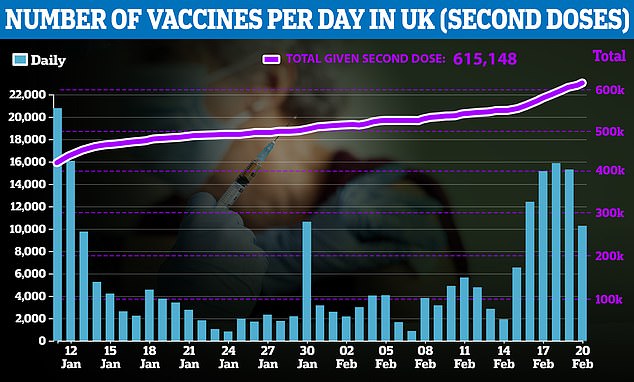
Is supply really to blame for the slowing down?
Ministers have repeatedly said the supply of vaccines is the ‘rate-limiting factor’ of Britain’s mission to vaccinate every adult by the end of July.
Although they have refused to say how many doses are being delivered, Boris Johnson, Matt Hancock and vaccines minister Nadhim Zahawi have said the NHS is giving out the jabs as fast as it is getting them.
The AstraZeneca and Pfizer jabs are the only ones available in the UK at the moment, and both faced manufacturing hiccups last month.
Pfizer had to reconfigure machines at its factory in Belgium, to cope with the huge demands of manufacturing, and AstraZeneca had to wait for its naturally grown vaccines to mature.
AstraZeneca, which manufactures in the UK, became embroiled in a bitter row with the EU over cutting back the continent’s supplies.
Although both the company and the UK Government insisted this hasn’t hit British stockpiles. The company is now believed to be providing 2million doses per week to Britain.
A third vaccine is expected to become available from next month – the jab made by US company Moderna, which is almost identical to Pfizer’s. Britain has ordered 17million doses of Moderna’s.
Advertisement
Both companies have refused to reveal how many of these doses have already been delivered to the UK.
However, a Pfizer spokesman said it had delivered 21 shipments by early January. It is not clear how many doses were in each shipment.
But Department of Health statistics show just 360,000 doses were dished out every day last week, on average.
This is down 17 per cent on the daily average of nearly 435,000 last Sunday. It is the lowest rate since January 22.
A total of 18.2million Covid vaccine doses have been given out so far, with 17.7million having received their first jab.
Figures reveal there has been an increase in the number of second doses dished out but not at levels high enough to spark any slowdown.
Critics have urged No10 to publish more detailed data on deliveries across the UK, so ‘pinch points’ in the drive can be identified and smoothed out.
James Lawson, a business strategist and fellow at the Adam Smith Institute, said the Government must stop the weekly fluctuations in the roll-out.
‘What we’ve spotted is there seems to be a persistent problem with the number of doses dropping over weekends,’ he told MailOnline.
‘And, while the Government has made huge progress in accelerating the vaccine rollout, there’s no excuse for this variability.
‘The virus doesn’t rest, the virus doesn’t sleep, the virus doesn’t stop at 6pm on a Friday and neither should the vaccine roll-out.’
Mr Lawson, who has written a paper on speeding up the rollout, said it was unclear what was sparking the fall inoculations because of the lack of data.
It was likely that both supply and distribution were playing a role in slowing down the rollout, he added, and that as soon as problems were solved in one area they tended to arise in another.
WHICH COVID VACCINES WILL BRITAIN GET ITS HANDS ON? 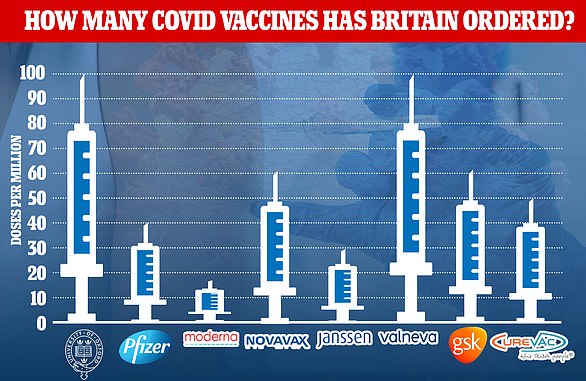
Pfizer/BioNTech (approved) 40million doses
The breakthrough jab was the first in the world to be proven to successfully block severe Covid-19 last year and it gained approval in the UK on December 2.
Type: It uses brand-new technology and is known as a messenger RNA (mRNA) vaccine. Conventional vaccines are produced using weakened forms of the virus, but mRNAs use only the virus’s genetic code to enters cells and tells them to create antigens, which make them look like the coronavirus.
Efficacy: Studies showed the two-dose vaccine could prevent severe illness in 95 per cent of people who were injected with it.
How many? The Government has ordered 40million doses, enough to vaccinate 20million Brits, but only a handful of million Brits have received the jab so far.
Oxford University/AstraZeneca (approved) — 100million doses
Type: Oxford’s vaccine is made from a weakened version of a common cold virus known as adenovirus which is genetically engineered to carry the genetics needed to create ‘spike’ proteins that make cells look like the coronavirus.
Efficacy: It was shown to be about 70 per cent effective at blocking Covid-19. In early results this varied from 62 per cent in people who received the full two doses to 90 per cent in people who received 1.5, however scientists say the 62 per cent figure has improved since those results were published.
How many? The UK has ordered 100million doses.
Moderna (approved) — 17million doses ordered
Type: Moderna’s jab also uses mRNA technology and works in a similar way to the Pfizer one already being offered on the NHS.
Efficacy: It was found to have 95 per cent efficacy in clinical trials.
How many? Britain has ordered 17million doses but was late to the party because it didn’t want to bet on this as well as the Pfizer jab, because both are based on the same technology. The first doses are expected to arrive in March.
Novavax (waiting approval) — 100million doses
Type: The Novavax vaccine works like other vaccines by teaching the immune system to make antibodies to the coronavirus spike protein. Researchers inserted a modified gene into a virus, called a baculovirus, and allowed it to infect insect cells. Spike proteins from these cells were then assembled into nanoparticles which, while they look like coronavirus, cannot replicate or cause Covid-19.
Efficacy: Novavax said the trials had shown its vaccine was 89.3 per cent effective at preventing Covid-19.
How many? Under a deal with the Government, 60million doses of the vaccine will be produced on Teesside for use in this country.
Janssen/Johnson and Johnson (waiting approval) — 30million doses
Type: The jab uses the same adenovirus technology as the Oxford University vaccine, making it just as easy to transport and store, but requires just a single injection to protect against Covid.
Efficacy: Johnson and Johnson said it prevents, on average, 66 per cent of all coronavirus cases among people who get the jab.
The company also found it prevented severe symptoms in 85 per cent of people and no-one who got the jab died or needed hospital treatment from 28 days after being inoculated.
The 66 per cent efficacy was a global average, with the jab preventing 72 per cent of cases in the US but only 57 per cent in South Africa, which is being devastated by a mutated variant that appears to be less susceptible to vaccines and immunity from older versions of the virus. It is promising, however, that the jab still worked in South Africa and still prevented hospitalisation.
How many? The UK has already struck a deal for 30million doses, with the option of ordering 22million more.
Valneva (in trials) — 100million doses
Type: This jab is an ‘inactivated whole virus vaccine’ which uses a damaged version of the real coronavirus to stimulate the immune system.
Efficacy: Unknown – trials are still ongoing,
How many? Britain has already ordered 100million doses and the first batches could be delivered by the end of 2021.
GlaxoSmithKline/Sanofi Pasteur (in trials) — 60million doses
Type: GSK’s vaccine is based on the existing technology used to produce Sanofi’s seasonal flu vaccine. Genetic material from the surface protein of the Covid virus is inserted into insect cells – the basis of Sanofi’s influenza product – and then injected to provoke an immune response in a human patient.
Efficacy: Unknown – trials are still ongoing.
How many? The UK in July secured 60million doses of the prospective treatment, but the companies say they will likely not be ready before the end of 2021.
Advertisement
Source link : https://www.dailymail.co.uk/news/article-9290041/Matt-Hancock-claims-Britains-Covid-vaccine-roll-quiet-week-supply-issues.html











